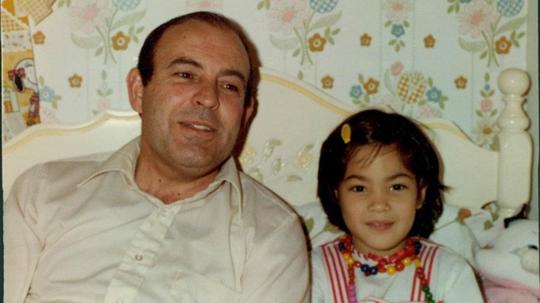
It's not easy building a new media company in the 21st century.
But Jay Newton-Small thinks she has the solution — or, at least, one solution.
Newton-Small, who is a former politics correspondent for TIME magazine and Bloomberg, found inspiration from her personal life.
See, in 2011, Newton-Small found herself the sole caregiver for her father. Her father had Alzheimer's, and her mom had just passed away suddenly from a brain aneurysm. "The stress was too great," Newton-Small said. "It was just part of the stress of taking care of dad, and they were in the process of moving up to D.C. when she passed very suddenly."
Newton-Small, an only child, found herself at the helm of her father's patient care.
"That becomes a grow-up moment very quickly when someone else becomes your dependent," Newton-Small said. "I tried to have him live with me for a minute, but it was just too hard."
Some days went better than others — one day, he remembered where he was, bonded with his daughter and successfully walked the dog around Washington, D.C., where Newton-Small lives. The next day, he would go for walk and not come back for four or more hours — police would show up at the door or give Newton-Small a call.
"I had a gas stove, and he was used to an electric stove, and I would come home to gas all over my apartment," she said. "It was clear that he was struggling, and I was struggling, so eventually I had to put him in a home."
Newton-Small, torn by the weight of caring for her father while also trying to work to support the family, found herself putting her father in a retirement home. They tried out a few — looking for the right fit for her father and his care needs.
That's when the idea for this aforementioned media company came to her.
"It can really change how we look at storytelling, and we’re collecting a whole generations’ stories that would otherwise be lost."
Each time they went to a new retirement home, Newton-Small filled out the same paperwork — over and over and over again. And she was taken aback by just how much she had to fill out. Information that tried to paint a picture of who her father was, but it was done in such a formulaic way.
"That second home asked me to fill out a 20-page questionnaire about his life, and I was like, 'Who is going to remember 20 pages of the handwritten data points for the like 150 residents living there?'" she said. "Not only do I have terrible handwriting that no one can read, but it's really wrenching, these questionnaires. It's like 'Define your parents' marriage in five lines.'"
"So I handed in the questionnaire blank and I went, 'Look, I'm just going to write you his story. It's a lot easier for me to do it that way, and I suspect it's a lot easier for you to consume it that way."
When her father passed away in 2016, Newton-Small brought that same practice into her next venture: MemoryWell.

MemoryWell is an online media company telling the stories of aging family members — and they don't necessarily have to be suffering from Alzheimer's or dementia, Newton-Small said. They partner with different retirement homes to tell the stories of consenting members (and families), and they also offer a consumer-facing product for families who want their loved one remembered, even if their loved one isn't in one of these partnering homes. The stories are aimed at not only helping a family member keep the memory of their loved ones alive, but they're also meant to act as supplements to those arduous questionnaires Newton-Small experienced.
"It began as a side project where me and some journalist friends who I would rope in would tell these life stories and it grew into the company that it is today," she said.
You won't find the stories just online, though. The MemoryWell team also provides hard copies of them for the residents of the homes, which makes sense given that many of the homes lack Wi-Fi or Internet access still.
The stories also act as a shadow box option, a set of items that sits outside a resident's room in case they get lost or forget where their room is.
"What our stories do is they go a long way to helping homes prove to families that they will know their loved ones, and they will engage with their loved ones," she said. "All of the people in the home will read the story."
MemoryWell has two full-time employees: Newton-Small and her new chief operating officer, Theo LeCompte, who joined the team in May from the Department of Commerce and Democratic National Convention Committee. But despite the small full-time staff, MemoryWell still has a network of 350 journalists across the country and across five retirement homes conducting interviews and compiling the stories. They also rely on a group of 12 ambassadors across 9-10 cities who sell the MemoryWell brand.
Most interviews are done through the phone. Family members send in a group of photos ahead of the phone call, and once on the call, the reporters basically just ask them to go through each photo: "What's the story here? Why is it important?" And then each interviewer asks the same standard nine questions, and each interview typically lasts between 45 minutes to an hour.
"They're pretty brief, and families love them because it's often very cathartic," Newton-Small said. "Caregivers often haven't had time in many months to really dwell on the good times and the past experiences that made you love this person so much."
Outside of both the business-to-business and business-to-consumer models, MemoryWell is playing with the idea of a subscription model.
Right now, the stories on the website are pretty static, with photos and tabs for things like favorite hobbies, family structure, favorite music and so on. What's up there is what stays up there. But with a subscription model, families can interact with the story — allowing them to upload videos, timelines and much more.

As for what that "much more" looks like — well, that's pretty much up to the family.
"For example, they would send it around to extended friends and family, and Uncle Joe would want to tell the story of how they went ice fishing in Michigan and whatever happened," she said. "You'll be able to really add to the story."
Their approach to the subscription model is what the team hopes will set them apart from competitors, like The History Project or StoryWorth. "A lot of our competitors have built interactive models, but they couldn't make a go of it," Newton-Small said.
"With our stories, what we found they help people do is they provide the backbone," she said. "It alleviates this feeling that 'I have to define this family' and the family can nibble around the edges where they want to. That's really what families wanted."
The focus is on trying to monetize the business. They have their various revenue models and streamlines, but, just like any startup, they have more upfront costs than they were expecting.
Newton-Small pitched at the WeWork Creator Awards back in March and brought home $130,000 for MemoryWell. They just wrapped up at the selective Halcyon incubator program, which focuses on social impact startups. And they have a Kickstarter campaign running through Sunday, where the funding would help pay those working for the group and other operational costs. Some of the rewards include famous journalists — like TIME's Joel Stein, ABC’s Ann Compton and NPR’s Lizzie O’Leary — writing the contributor's story.
Moving forward, they're looking at a few potential partnerships to help elevate their street cred, and they're always expanding into new states and new markets.
"We turn the journalism model on its head," Newton-Small said. "It can really change how we look at storytelling, and we're collecting a whole generations' stories that would otherwise be lost."
Images courtesy of Jay Newton-Small




